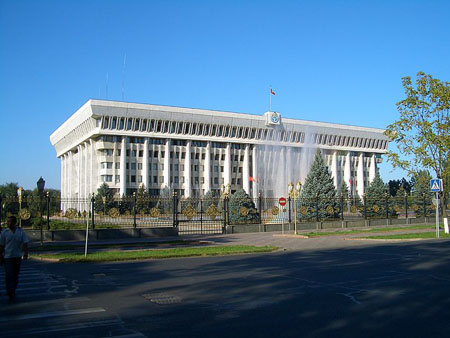
Kyrgyzstan is a small and mountainous country far from the sea in the middle of Asia. One third of the population lives under the poverty threshold. It is also right at the top of international corruption rankings. The short recent history of the Kyrgyz Republic, founded in 1991, is known for political crises, economic problems, ethnic turmoil and uprisings.
Memories of the 75 years of repression and persecution under Soviet rule are still fresh. The years of the communist state were a time when Islam was eliminated from every sphere of life, when people’s ties to religion were broken and when anything to do with Islamic moral values was eradicated by the hand of the state.
With the collapse of the Soviet Union, the 1990s ushered in a new beginning for our Kyrgyz brothers. Religious freedoms and rights and religious institutions were guaranteed with the constitution. The Kyrgyz people once again began to learn about Islam, the Qur’an and religious values. Today eighty-five percent of Kyrgyz citizens are Muslims.
Following the declaration of independence a large number of mosques were built, particularly with funds and financial support from overseas, and Islamic educational institutions were opened. The striking thing is that different religious views - all under the name of Islam - spread across Kyrgyzstan.
However, these fine developments were accompanied by a grave threat; a radical ideology based on false hadiths and superstitions under the name of Islam, and the policies of terror, violence and hatred it brought with it. The increasing radicalism and fundamentalism in nearby countries such as Afghanistan, Pakistan and Iran led the Kyrgyz government to adopt new measures. These measures manifested themselves in much tighter control over religious bodies and institutions and restrictions of various kinds.
A speech Kyrgyzstan President Almazbek Atambayev made in November received a great deal of media coverage all over the world. Atambayev said that radical Islamic movements were on the rise in Central Asia and represented a serious threat to national security. He accurately diagnosed the disease by saying, “Radical Islam has nothing to do with the true Islam.” However, it was unclear just what preventive measures would be taken.
In the days following this speech, reports began coming in of large numbers of arrests in operations in various towns across Kyrgyzstan. These people were accused of being members of radical terror organizations and involvement in acts of terror. Every country has a genuine right to fight radical terror organizations, but it is important to do this within a legal and just framework. A repressive policy aimed against Muslims by using these terror organizations as a pretext will obviously just lead to greater disorder in the country. The Kyrgyz government must therefore make a very careful distinction and be careful about not creating oppression over devout Muslims wishing to live by their faith.
Another problem that has been on the agenda since the days of independence is the Kyrgyz-Uzbek tension; that tension manifests itself from time to time with looting and bloody clashes. Most recently, in 2010, some 500 people, mainly Uzbeks, lost their lives in uprisings in the towns of Osh and Jalalabad. On the one hand are the Kyrgyz people, and on the other the Uzbeks, who comprise some 15% of the population: Both groups are brothers and Muslims. The ethnic problems however are still continuing. Unfair and unjust practices against Uzbeks, poverty and ignorance also prevent an exact solution to the problems.
The Kyrgyz people are very good mannered, modest, moderate and loving people. However, some young Kyrgyz people raised in the darkness of nonsense masquerading as Islam are known to have crossed in to Afghanistan and received military training and to have been later used in acts of terror in the Middle East. Kyrgyzstan, with its problems and uncertainties, becoming a terrorist recruiting ground is most certainly a danger not to be underestimated.
Religious fanaticism continues to spread, despite the legal measures brought in by the Kyrgyz government in recent years. So what needs to be done? Leaving things to sort themselves out is certainly no answer. Non-democratic interventions or harsh measures that violate human rights will not solve the problem either. In fact, they will just make it worse.
An Important Call to Opinion Shapers and Leaders of the Kyrgyz State
There are today some two thousand mosques and numerous madrassas and religious bodies in our Kyrgyz brothers’ homeland. Of course this is a most pleasing state of affairs. However, these have to be filled with the true Islam, not fundamentalist ideas or radicalism.
Guns and threats are no answer to the problems in Kyrgyzstan and the menace of radicalism. They can only keep the lid on problems for a certain length of time, like a bomb waiting to go off.
It is vitally important for policies that embrace all the oppressed sections of Kyrgyz society to be set in motion urgently and for there to be a transparent, just administration that acts out of feelings of love, affection and compassion; one that focuses on spiritual growth together with material growth, and for corruptions to be prevented. Young people purged of all fundamentalist nonsense and raised with the moral values of the true Islam based on love and peace will obviously keep away from groups that favor violence.
Kyrgyzstan is sometimes described as ‘the Switzerland of central Asia’ because of its mountainous terrain. We hope that it will one day be described in that way because of its advanced democracy and high standards of living, rather than its terrain.
http://http://indianmuslimobserver.com/2014/12/21/the-way-out-for-kyrgyzstan/


